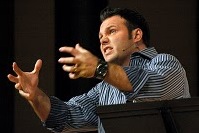 The following clip comes from an informed blog by Richard Beck, a professor of psychology at Abilene Christian University. (You might want to go to the blog to read the whole post.) He examines Mark Driscoll’s male images and … well, I’ve clipped some concluding material.
The following clip comes from an informed blog by Richard Beck, a professor of psychology at Abilene Christian University. (You might want to go to the blog to read the whole post.) He examines Mark Driscoll’s male images and … well, I’ve clipped some concluding material.
I’ve argued in Thought #1 and #2 that Driscoll should not be so easily dismissed. The question he’s raising–Why are males not more attracted to church?–is worth asking. And one of his diagnoses on this issue–Church leaders are chickified–has some merit to it.But the dark side of Driscoll’s ministry is its chauvinism and misogyny. And this criticism is also valid for certain impulses one finds in the Christian men’s movements. Specifically, the assertion of masculinity implies a suppression of women and a restoration of male power over women. To be a “Christian man” means “reclaiming” and “taking back” leadership roles in both the family and the church. Men use spiritual warrant to assert power over women.So the issue we need to raise is this: Does the assertion of masculinity in the church necessarily involve an assertion over against women? Can masculinity be asserted in an egalitarian manner?
I think it is possible to recognize gender distinctives without getting into power plays. But I’ll admit that this is rare and hard to do. Too often in the church to be male means to assert power over women. And I think Driscoll is guilty on this score.
The point is, I don’t mind Driscoll’s focus on trying to reach “real guys.” I think he’s right about this being a demographic that is being lost to most churches. Also, I’m largely in agreement with the diagnosis that chickified church leaders struggle to reach the “real guy” demographic. I say this proudly as a chickified guy who enjoys knitting and writing poetry. So I’m not offended. I see what he’s talking about.
But when “real guy” creeps into misogyny, with men asserting power over women through the euphemism of “leadership”, I’m in strong moral disagreement.

